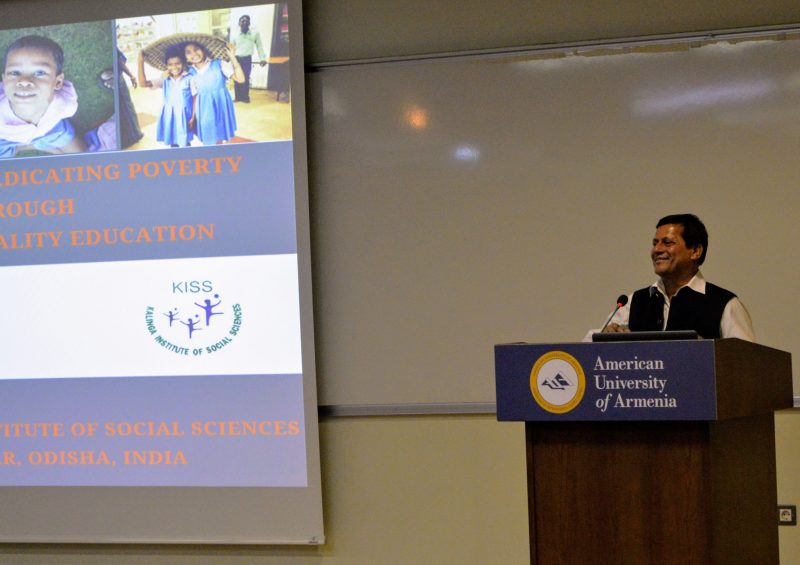
AUA Hosts 2017 Aurora Dialogues Open Lecture: Dr. Achyuta Samanta
2 min readYEREVAN, Armenia – On May 29, Dr. Achyuta Samanta, Founder of Kalinga Institute of Social Sciences (KISS) and Kalinga Institute of Industrial Technology (KIIT University) delivered an open lecture within the framework of the 2017 Aurora Dialogues on eradicating poverty through quality education.
Dr. Samanta’s story is one of determination. He was born into poverty in a village in the Odisha state of India. His father passed away at age four, and in spite of hardships, he continued to pursue his dream of an equitable life. His own experiences of poverty, deprivation, and hunger led him to make a commitment to accessible education and, eventually, found the Kalinga Institutes of Social Sciences and Industrial Technology. His harsh childhood led Dr. Samanta to the conclusion that ignorance and illiteracy “kill people from within” and deprives them from developing further.
Rising above circumstances, Dr. Samanta completed his Master’s degree in Chemistry in 1990 and became an academic, yet he still felt a need to give back to his community and to those who shared a similar story of hardship. Particularly, in his state of Odisha, one-quarter of the 45 million population are classified as indigenous people and marginalization coupled with abrupt changes due to mining and deforestation have forced them to become completely cut off from modern life.
Though born into poverty himself, Dr. Samanta was not born into a tribe and, therefore, decided to live in tribal communities for a period to gain a better understanding of the problems they face. Here, he also observed how the government and non-governmental organizations (NGOs) made efforts to develop the communities, as well as noted where and why their efforts failed. He reaffirmed that lack of education was the primary reason why communities were unable to develop despite tremendous contributions made by the Government and various NGOs.
Leveraging the experiences of his own life and visits to the tribal hinterland, Dr. Samanta used all his savings to launch KIIT in 1992 in a modest rented building in Bhubaneswar. The University offers undergraduate and graduate courses in engineering, biotechnology, medicine, management, law, computer application, rural management, and supplied many industries in need of qualified employees in the country. The revenue from KIIT served as a sustainable model to then found KISS, which was dedicated specifically to advancing education among tribal children.
“The education we provide is complete and comprehensive beginning with kindergarten through graduate studies. Half education is more harmful than no education,” Dr. Samanta noted with conviction. Having lived among tribal communities, he knew first hand that dropout students were more likely to become targets for extremist and terrorist recruitment.
Over time and with Dr. Samanta’s vision, the success of KISS began to attract the attention of strategists and administrators on different levels of government within the country and abroad creating a demand for more Insitute branches. As a result, the two institutes combined serve over 27,000 students from 45 countries.
“Giving is an art and it is the ethos of my life. I consider my greatest achievement to be the ability to have taken my experiences and implement them in the greater interest of society.” Dr. Samanta concluded.

